The Jewish Feasts and the benefit they have for Christians today
Jesus was Jewish. There’s no doubt about that. God told the Jewish people years ago what to look for in their Messiah. Two pictures immerged. One was of a Suffering Messiah. The other one was of a Kingly Messiah. What most Jews didn’t understand was that it would be the same person at two different times. The 1st as a suffering servant dying for the people’s sin. The 2nd as a king, reigning over everyone.
But God’s central message was that a Messiah would come to save us from our sin, to reconcile us to God, and to give us eternal life with Him. To continually remind people of this, God instituted Jewish Feasts (Deuteronomy 6:1-9). By participating in these “Feasts”, they give us visual and experiential reminders of the Lord’s presence in our lives. All the specific ways to celebrate these feasts, including menu’s, are in the wonderful book, “Celebrating Biblical Feasts: In your Home or Church” by Martha Zimmerman, available thru Amazon or Christian Book Distributors. These are living, joyous events. So, let’s dig in and discover what these feasts are all about.
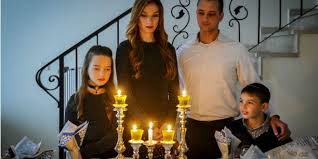
Sabbath – This English word comes from the Hebrew word ‘Shabbat’. It means ‘rest’. The Sabbath was instituted as a memorial to God’s creating the world in six days. On the seventh day, He rested. Not because He needed to rest but because He didn’t want us to work all the time. He wanted us to take one day every week to remember that He is our Creator. He also wanted us to re-create time with our family, to recreate with them so they would have good memories of our family time together.
Exodus 20:8-11 encourages us to ‘remember’ God.
Deuteronomy 5:12 says to ‘observe’ this day.
Sabbath is a weekly time to remember what God has done for us and to prepare ourselves and plan for what He will do in the coming week. While the preparations for celebrating the Sabbath are specific, its important to remember that it’s made for us. So, don’t be legalistic about it. It’s a time to rest and recreate. It’s from sundown every Friday to sundown Saturday.
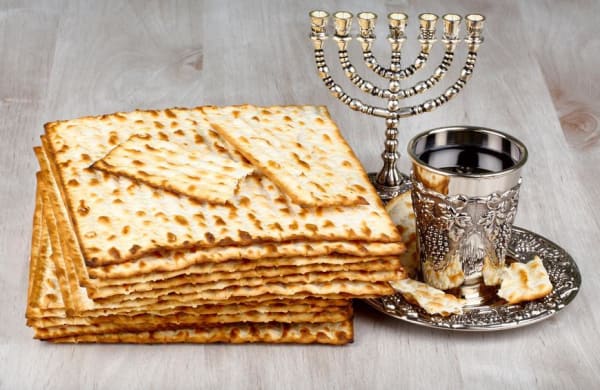
Passover commemorates God’s deliverance of Israel out of Egypt (Exodus 20:1,2). The Jews had been slaves in Egypt for over 400 years. God sent Moses and Aaron to Egypt to ask Pharaoh to free the Jews (Exodus 5:1). Pharaoh didn’t recognize Moses’ God and said no (Exodus 5:2) and treated the Jews even worse (Exodus 5:7-18). God gave Pharaoh nine signs that proved He is God and should be listened to (Exodus 7:14 – 10:29). Pharaoh didn’t listen to any of them (Exodus 10:27) but just further hardened his heart toward God. Then God told Moses that He was going to kill all the first-born sons in the land of Egypt (Exodus 11:1-10 & 12:29-30). For the Jews to protect their first-born sons, God instructed them to do certain things with their family on the night the death angel would pass thru Egypt killing all the first-born sons (Exodus 12:1-13, 21-28). If they did these things, the death angel would ‘pass over’ their house and not kill their first-born son. This night and everything God had them do would forever more be called “Passover”.
After that night, Pharaoh relented and freed the Jews. Pharaoh’s first-born son had died and his god could not bring him back to life. The Jews left Egypt, bound for the Promised Land. Everything the Jews did that night was symbolic of what God would do thru Jesus, their real Messiah.
Here are just a few of the similarities between the Passover and Jesus:
Passover; Jesus;
1 )A perfect, spotless lamb (Exodus 12:5) Is the perfect lamb (John 1:29, 1st Peter 1:29)
2) Kill the lamb (Exodus 12:6,21) Jesus is killed (Matthew 27:22-25)
3) Put the blood of the lamb on the side This traces out the sign of the cross
and top of the door posts
(Exodus 12:7, 13, 22, 23)
4) Jews were delivered from slavery People are delivered from sin
(Exodus 13:16) (Romans 5: 6-8)
5) None of the lamb’s bones will be Jesus’ bones weren’t broken (John 19:36)
broken (Exodus 12:46)
6) The Passover dinner The Last Supper was a Passover dinner
7) The three pieces of bread with the Jesus said “This is my body, broken for you”
middle piece being broken (Luke 22:19)
8)The 3rd cup is the cup of redemption Jesus said this cups His blood, which is shed
for us (Luke 22:20).
There are many, many more similarities in the actual Passover Seder meal itself. Each year we look forward to when we will celebrate it with Jesus (Luke 22:18).
To host a Passover Seder meal and service, read the book by Martha Zimmerman. She includes everything in it from how to do the service to how to prepare the recipes.
The Feast of Unleavened Bread (Leviticus 23:6-8 & Exodus 12:15-20) and the Feast of First Fruits (Leviticus 23:9-14) have been incorporated into Passover.

The Feast of Pentecost or Weeks (Shavout) is mentioned in Leviticus 23:15-22.
For the Jew, it’s a time to offer thanks to God for the abundance of the food harvest that is to come later in the year. Pentecost is celebrated 50 days after Passover. The ‘50th day’ in Greek is ‘pentecost’.
Jews also believe that this is the time that God gave Moses the Law on Mt. Sinai. Rabbis have said that there is no liberty without law and self-discipline. A train needs rails and a river has banks.
For the Christian, Pentecost is the birthday of the church. God came and filled all believers with His Spirit (Acts 2). This was fulfilling the prophecy in Joel 2:28-32. This is the Promise of the Father (Acts 1: 4-5) that Jesus talked about. This is the New Covenant prophesied in Jeremiah 31;31 and talked about in Hebrews 9:11-15. We are free ‘from’ the Old Covenant so we can be free ‘to’ the New Covenant. But we become free to not do as we please but as God pleases. We are no longer slaves to sin (Romans 6:6) but are slaves to God (Romans 6:22-23). We are no longer under the Law but are under Grace (Romans 6:14-18).
They looked forward to the great harvest of souls that was to come. The first fruits of this greater harvest came when 3,000 people were saved on that 1st Pentecost (Acts 2:38-41).
Each year when we celebrate Pentecost, we now look forward to the harvest of souls that are yet to come. How to celebrate Pentecost, read the referenced book by Martha Zimmerman. Pentecost is celebrated in May/June.
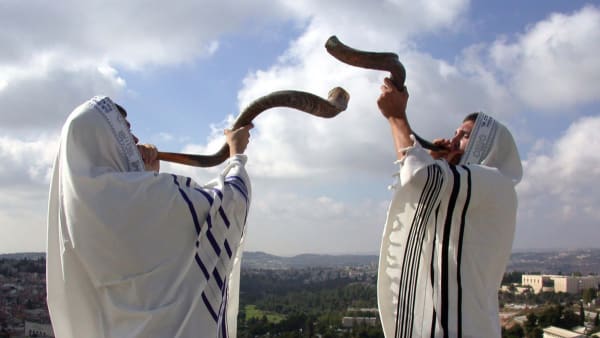
Rosh HaShanah or the Feast of Trumpets is the beginning of the Jewish New Year. The Hebrew word ‘Rosh’ means ‘beginning’. ‘HaShanah’ means ‘year’. Ezekiel 40:1 uses the word Rosh HaShanah. It translates into English as ‘at the beginning of the year’. On September 20, 2020, it will be the start of the Jewish year 5781. Jews believe that the Creation was 5,781 years ago on this date. Obviously, Jews go by our regular calendars also, but spiritually some Jews (though not all) believe that the world was created 5,781 years ago. Rosh HaShanah is the start of the “High. Holy Days”. It is the beginning of 10 days of repentance. The 10th day culminates with Yom Kippur, the Day of Atonement.
Rosh HaShanah starts with the blowing of the trumpet (Leviticus 23:23-25 & Psalm 150:1-3 & Numbers 29:1-6). The trumpet was blown to call all of Israel to repentance by saying “You who are asleep, wake up. You who are in a trance, arise. Search your doings and repent. Remember your Creator…” The apostle Paul echoed these words in Romans 10:13 (“…it is already the hour for you to awaken from sleep, for salvation is nearer to us than when we believed”) and in Ephesians 5:14 (“Awake sleeper, and arise from the dead, and Christ will shine on you.”)
One of the traditions is to throw rocks, representing our sins, into a river or lake that carries them away with the current. Micah 7:19 says that God will cast all of our sins into the sea. Psalm 103:12 says, “As far as the east is from the west, so far has he removed our transgressions from us.” Rosh Hashanah is for remembering and repenting. It is celebrated in September/October.
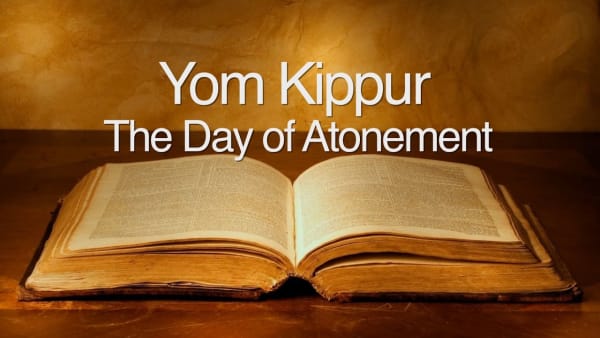
Yom Kippur is the Day of Atonement and comes 10 days after the start of Rosh HaShanah. The Hebrew word “Yom” means ‘day’ and “Kippur” means ‘atonement’ or ‘covering’.
Atonement means that God and man are now reconciled. There is no longer any separation between them. But, according to the Jews, this reconciliation had to be done once year. You name would be written in God’s Book of Life for the coming year (Leviticus 16:29-34 & 23:26-32). It looked forward to a time when the final sacrifice would be made by instituting a New Covenant (Jeremiah 31:31-34). Isaiah 53 talks of a suffering servant who will be the final acrifice. Hebrews 10:1-22 explains it perfectly by saying that if the sacrifice of bulls and goats had been enough, they wouldn’t have needed to be repeated every year. That these yearly sacrifices looked forward to a once-for-all final sacrifice that Isaiah 53 talked about. The Old Testament yearly sacrifices never washed away the people’s sins. They just covered them up.
The Jewish High Priest would go into the Most Holy Place in the Temple once a year. He would place the blood of an innocent, perfect lamb on the mercy seat of the Ark of the Covenant between the two angels. The Ten Commandment tablets, along with Aaron’s rod, were in the Ark. The mercy sea was the top covering of the Ark. This blood would cover the mercy seat, so when God looked down on it, He wouldn’t see the people’s sins that the ten commandments below would illuminate. He would see the blood of the innocent, perfect lamb and not our sin. But this blood covering was only temporary. It covered but it didn’t wash away the people’s sins. Which is why it had to be repeated very year. When the blood of the Messiah, God’ perfect lamb, was poured on the mercy seat, it washed away our sins permanently. This is why the Temple veil, that separates the Most Holy Place (the presence of God) from the Holy Place was torn in two (Matthew 27:51). Its God’s way of saying that the final sacrifice has been made. There is now nothing that separates us from God’s presence.Instead of the High Priest going into God’s presence once a year, all believers can come into His presence whenever we want to. We can come boldly into His presence any time (Hebrews 4:16). Our names are now written in God’s Book of Life (Revelation 20:15 & 21:27).
Since the Jewish Temple in Jerusalem was destroyed in 70A.D., Jews could no longer offer biblical sacrifices for atonement of their sins. How could they have their sins forgiven for the coming year? Their rabbi’s have said that by doing good works, praying and making charitable donations that these things make up for it. But that is not what God says.
So Yom Kippur is a day of prayer and fasting for the Jews but a day of celebration for Christians because Jesus was our once-for-all, final sacrifice for sin (Hebrews 9:11-28). When Jesus returns, the remaining Israelites will look on Him whom they have pierced and repent (Zechariah 12:10). Yom Kippur is celebrated in September/October, 10 days after Rosh HaShanah.
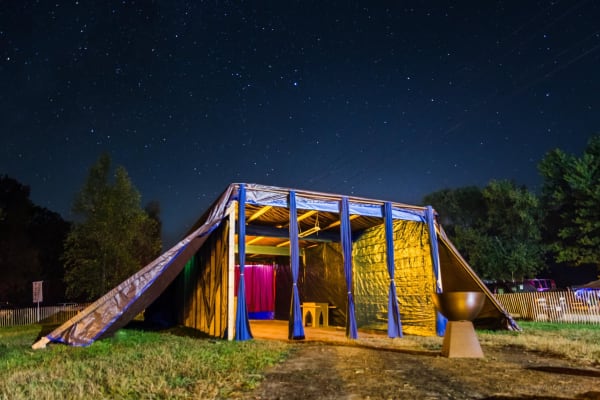
Sukkoth, or the Feast of Booths (or huts or Tabernacles), was the first place the Jews stopped at when they left Egypt with Moses at the time of the Exodus. The name is explained in Genesis 33:17 when it says that Jacob/Israel journeyed to Sukkoth and built for himself a house and made booths for his livestock. Therefore, the place is called Sukkoth. The Hebrew word Sukkoth means huts, booths or tabernacles. It is a celebration of the fall harvest. It’s a time to remember that God cared for them when they left Egypt and their slavery and wandered in the Sinai desert for 40 years (Nehemiah 8:14-17). They celebrate by building and living in temporary huts for eight days (Leviticus 23:39-43).
In New Testament times, a special part of this festival was when a priest would go to the Pool of Siloam and draw out water with a golden pitcher. He then poured the water into a bowl at the altar in the Temple. This visually demonstrated God’ faithfulness in sending rain to Israel to water their crops. This was a demonstration of Israel’s hope that the Messiah would come and pour out His Holy Spirit on people (Isaiah 44:3 & Joel 2:28-32). It reminded the Jews that God would provide for them like He did in that desolate wilderness of Sinai (Isaiah 55:1 & 58:11).
Jesus celebrated this feast in John 7:2-14 when He taught in the Temple. People were amazed that He, a carpenter’s son, had become such a learned man. In John 7:37-38 He said, “If any man is thirsty, let him come to me and drink. He who believes in Me, as the scripture said, ‘From his innermost being shall flow rivers of living water”.
Sukkoth also represents the final harvest when all nations will celebrate the blessings of God’s eternal kingdom, heaven (Zechariah 14:16-19). Sukkoth is celebrated in September/October.
As Christians, we can celebrate these Jewish feasts because we can see how God protects and provides for His people. All these festivals point toward what our Messiah has done for us, what He is doing for us now and what He will do for us in the future.
So, have fun celebrating Jesus thru these Jewish festivals.
Two additional feasts that the Jews celebrate, although not commanded to by the Lord, are Purim and Hanukkah.
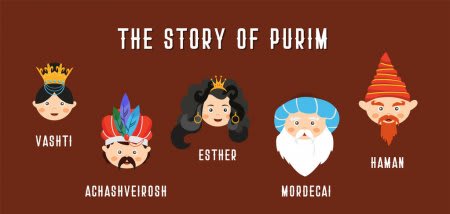
Purim, or the Feast of Lots, commemorates the deliverance of the Jews (who were exiled in Persia at the time) in the Old testament book of Esther. Esther was the Jewish wife of the Persian King Xerxes. Her cousin, Mordecai, uncovered a plot by one of Xerxes’ officials named Haman, to kill all the Jews living in Persia. Purim celebrates God’s faithful protection of the Jews in Esther 9:18-32. Purim means “lots”. It refers to the lot that Haman cast to decide the day of destruction that the Jewish people were supposed to be killed (Esther 3:7). God’s name is not mentioned at all in Esther but His presence is obvious. Purim is celebrated in February/March.
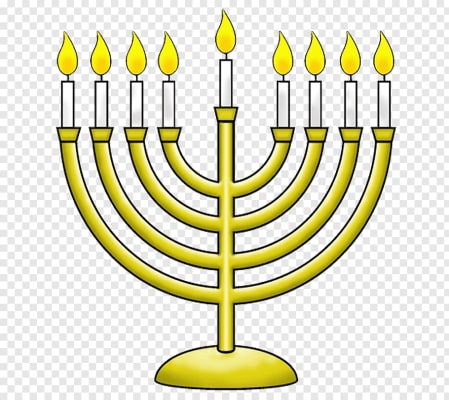
Hanukkah, or the Festival of Dedication or Lights, celebrates the Maccabee’s victory over the Greeks. The Seleucid King Antiochus Epiphanes ruled Israel at the time. He mocked and defiled the Jews by sacrificing, not an unblemished lamb in the Temple, but a pig (considered an unclean animal by the Jews). He then poured out the pig’s blood on the bible scrolls. The Maccabee’s were a prominent Jewish family. They rose up and defeated the King in about 165 B.C. The reason it’s called the Festival of Lights is because after the Jews cleansed the Temple of the pig, they found that there was only enough oil to last one night. The lit oil lamp represented the very presence of God. But miraculously, the oil lamp stayed lit for eight days. The Jews saw this as a reminder of those who courageously remain faithful to God in the face of persecution. Jesus celebrated this festival in John 10:22-23. Hanukkah is celebrated in November/December.
The festivals are celebrated in this yearly order:
Sabbath – every week
Purim – February/March
Passover (including the festivals of the Unleavened bread and First Fruits) – March/April
Pentecost – May/June
Rosh HaShanah – September/October
Yom Kippur – September/October
Sukkoth – September/October
Hanukkah – November/December
The reason we put February/March or September/October is because the Jewish year is not quite equal to our regular calendar year. So, the dates of these festivals change every year according to our regular calendar.







